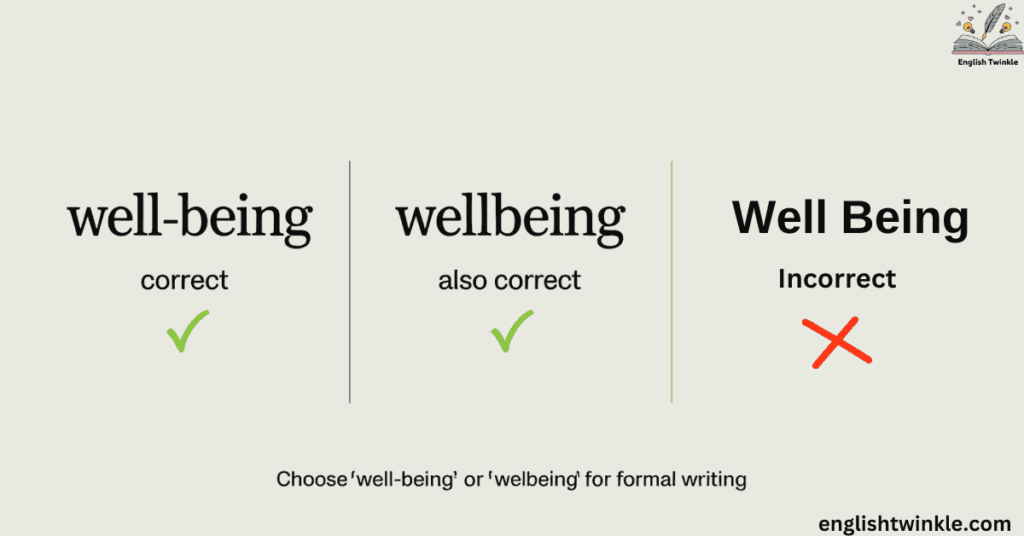In the world of health and happiness, words matter. And few terms have sparked as much discussion as the various spellings of “well-being.” This article dives deep into the nuances of well-being, wellbeing, and well being, exploring their origins, usage, and impact on our understanding of wellness. The debate of “Well-being vs. Wellbeing” has become particularly prominent, reflecting the evolving nature of language and our approach to discussing health and happiness.
The Etymology of Well-Being
The concept of well-being has roots that stretch back centuries. Originally two separate words, “well” and “being” joined forces to describe a state of health, happiness, and prosperity.
Over time, the term evolved:
- 16th century: “well being” (two words)
- 18th century: “well-being” (hyphenated)
- Late 20th century: “wellbeing” (one word)
This evolution reflects our changing relationship with language and the concept itself.
A Global Perspective on Spelling
The spelling of well-being varies across the English-speaking world:
| Region | Preferred Spelling |
|---|---|
| United States | Well-being |
| United Kingdom | Wellbeing |
| Canada | Well-being |
| Australia | Wellbeing |
International organizations often have their own preferences. The World Health Organization, for instance, uses “wellbeing” in its publications.
Style Guides and Official Recommendations
When it comes to writing and proofreading, style guides offer valuable insights:
- AP Stylebook: Recommends “well-being”
- Chicago Manual of Style: Prefers “well-being”
- Oxford English Dictionary: Lists “well-being” as the primary spelling
These guides shape the landscape of professional writing, influencing how we discuss health and happiness in formal contexts.
The Case for Each Spelling
Each variant has its merits:
Well-being
- Traditional and widely accepted
- Clearly shows the compound nature of the term
- Preferred in academic writing
Wellbeing
- Modern and streamlined
- Reflects the term’s evolution into a single concept
- Gaining popularity in digital media
Well being
- Rarely used
- Sometimes seen in casual writing
- Not recommended by style guides
Impact on Search Engine Optimization (SEO)
In the digital age, spelling affects more than just grammar—it impacts discoverability. A quick analysis reveals:
- “Well-being” has the highest search volume
- “Wellbeing” is gaining ground, especially in the UK and Australia
- “Well being” lags far behind in search popularity
For writers and content creators, this means considering your audience’s location and search habits when choosing a spelling.
Using Well-Being in Context
Proper usage is key to clear communication. Here are some examples:
- “The company’s focus on employee well-being led to increased productivity.”
- “Studies show that regular exercise contributes to overall Well-being vs. Wellbeing.”
- “The conference explored various aspects of physical and mental well-being.”
| “The secret of health for both mind and body is not to mourn for the past, worry about the future, or anticipate troubles, but to live in the present moment wisely and earnestly.” – Buddha |
This quote underscores the holistic nature of well-being, encompassing both mental and physical health.
Beyond Spelling: The Concept of Well-Being
Regardless of how you spell it, well-being is a multifaceted concept that includes:
- Physical health
- Mental and emotional balance
- Social connections
- Spiritual fulfillment
- Financial stability
Understanding these dimensions helps us grasp why Well-being vs. Wellbeing has become such a crucial topic in today’s fast-paced world.
Well-Being in Various Fields
The concept of well-being has permeated various aspects of society:
Psychology and Mental Health
Psychologists use well-being scales to measure life satisfaction and emotional health.
Corporate Wellness Programs
Companies invest in employee well-being to boost morale and productivity.
Public Health Policies
Governments design initiatives to improve the overall well-being of citizens.
Education
Schools integrate well-being practices to support student development.
Synonyms and Related Terms
Understanding related vocabulary enhances our grasp of well-being:
| Term | Definition | Example |
|---|---|---|
| Wellness | State of being in good health | “The spa offers wellness retreats.” |
| Quality of life | Overall satisfaction and happiness | “The city’s quality of life attracts new residents.” |
| Flourishing | Thriving in all aspects of life | “The program aims to help individuals flourish.” |
Common Mistakes and How to Avoid Them
When writing about well-being, watch out for these pitfalls:
- Inconsistent hyphenation within a document
- Mixing British and American spellings
- Using “well being” in formal writing
Pro tip: Choose one spelling and stick to it throughout your piece for consistency.
The Future of Well-Being Terminology
As our understanding of health and happiness evolves, so too might our terminology. Trends to watch:
- Increased acceptance of “wellbeing” in formal writing
- New compound terms related to specific aspects of well-being
- The impact of social media on language evolution
Conclusion: Choosing the Right Spelling for Your Audience
In the end, the choice between Well-being vs. Wellbeing, and well being comes down to context, audience, and personal preference. Consider:
- Your readers’ location and expectations
- The formality of your writing
- Consistency within your document or brand
Whatever spelling you choose, remember that clear communication about health, happiness, and prosperity is the ultimate goal.
Additional Resources
For further exploration:
- Merriam-Webster Dictionary
- Oxford English Dictionary
- World Health Organization: Well-being and Mental Health
By delving into the nuances of well-being terminology, we not only improve our writing and proofreading skills but also deepen our understanding of this vital concept. Whether you’re discussing physical health, mental happiness, or overall prosperity, the right words can make all the difference in conveying your message effectively.

